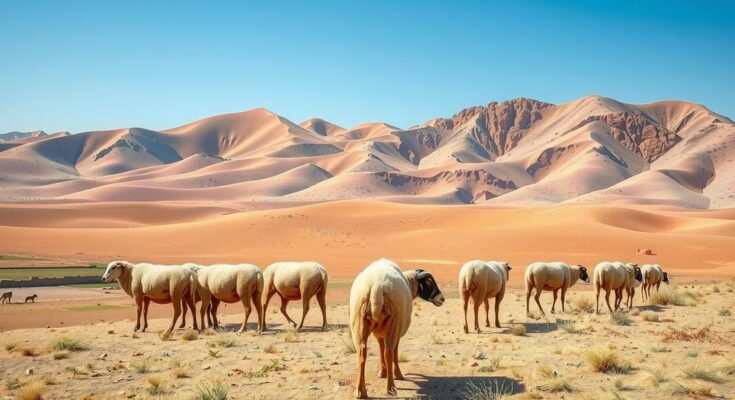Due to drought-related livestock shortages, King Mohammed VI of Morocco has requested citizens to not perform sheep slaughter during Eid Al-Adha. The decline in livestock populations and reduced rainfall have led to economic challenges, prompting the import of sheep from Australia and the suspension of certain taxes to stabilize prices.
King Mohammed VI of Morocco has requested that citizens refrain from the customary slaughter of sheep during Eid Al-Adha this year due to a significant decline in livestock resulting from prolonged drought conditions. The celebration, set to occur in June, traditionally commemorates Abraham’s willingness to sacrifice his son, with meat shared among families and given to those in need.
Recent official reports indicate that Morocco’s cattle and sheep herds have declined by 38 percent when compared to the last census nine years ago, primarily due to the ongoing effects of drought. In a letter read by religious affairs minister Ahmed Taoufiq on state television, the King emphasized the importance of balancing religious practices with the current climatic and economic challenges affecting livestock numbers.
The King underscored that performing the ritual under such adverse conditions would adversely impact many citizens, particularly those with lower incomes. This year, rainfall has been recorded at 53 percent below the average of the past three decades, leading to insufficient pasture resources for livestock, which in turn has contributed to decreased meat production and rising market prices.
In an effort to address these shortages, Morocco has entered into an agreement to import up to 100,000 sheep from Australia. Additionally, the country’s 2025 budget includes provisions to suspend import duties and a value-added tax on livestock and red meat to stabilize domestic market prices.
In summary, King Mohammed VI has urged Moroccans to abstain from sheep slaughter during Eid Al-Adha due to severe livestock shortages stemming from ongoing drought. This call reflects the critical need to consider both religious traditions and the current economic climate, which has resulted in increased prices and the necessity for livestock imports.
Original Source: www.arabnews.com




